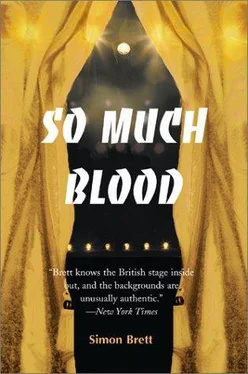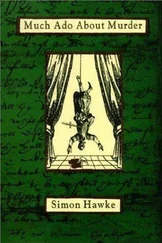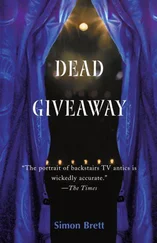Simon Brett - So Much Blood
Здесь есть возможность читать онлайн «Simon Brett - So Much Blood» весь текст электронной книги совершенно бесплатно (целиком полную версию без сокращений). В некоторых случаях можно слушать аудио, скачать через торрент в формате fb2 и присутствует краткое содержание. Жанр: Классический детектив, на английском языке. Описание произведения, (предисловие) а так же отзывы посетителей доступны на портале библиотеки ЛибКат.
- Название:So Much Blood
- Автор:
- Жанр:
- Год:неизвестен
- ISBN:нет данных
- Рейтинг книги:3 / 5. Голосов: 1
-
Избранное:Добавить в избранное
- Отзывы:
-
Ваша оценка:
- 60
- 1
- 2
- 3
- 4
- 5
So Much Blood: краткое содержание, описание и аннотация
Предлагаем к чтению аннотацию, описание, краткое содержание или предисловие (зависит от того, что написал сам автор книги «So Much Blood»). Если вы не нашли необходимую информацию о книге — напишите в комментариях, мы постараемся отыскать её.
So Much Blood — читать онлайн бесплатно полную книгу (весь текст) целиком
Ниже представлен текст книги, разбитый по страницам. Система сохранения места последней прочитанной страницы, позволяет с удобством читать онлайн бесплатно книгу «So Much Blood», без необходимости каждый раз заново искать на чём Вы остановились. Поставьте закладку, и сможете в любой момент перейти на страницу, на которой закончили чтение.
Интервал:
Закладка:
Since the pubs were not open on Sunday, he had cabbage lunch with the rest of the group. The conversation was all of the coming shows. Willy Mariello’s death had been almost forgotten. Charles looked round the table. Anna was not there. He suddenly wished she was, or wished that he was with her somewhere keeping the blues at bay.
The loud T-shirted crowd joked and attitudinised. He felt old and envious. Their values were so simple. What they were doing on the Fringe was the most important thing that had ever happened; that was all there was to it. Their shows consumed all their thoughts and energies.
Except for the thoughts of one person-the murderer. He or she must be feeling regret or anxiety or something. But the lunch time crowd showed no signs of guilty conscience. They all seemed interchangeably brash and cheerful. Pam Northcliffe was up the far end of the table as nervously bright and giggly as the rest. Communal excitement had replaced the short tempers of earlier in the week.
Martin Warburton was not there. Charles wondered if he would be sharing in the group gaiety if he were. There was still a lot to be found out about Martin Warburton. That afternoon might be a good opportunity to read Who Now? — a Disturbing New Play.
It was disturbing. The language was good, there was some sense of structure, but the content was frightening. As the title implied, questions of identity figured large. None of the characters seemed to have a fixed personality; they were chameleons who took on the colour of different forms of violence. There was a woolly Leftish political message coming through the monologues that made up the play. Its main tenet seemed to be that, come the Revolution, the bourgeois would be destroyed. But it was the way in which they were going to be destroyed that was disturbing. Images of bombings, secret beatings and firing squads abounded. Continually blood welled, bones cracked, corpses twitched and entrails spilled. So much blood.
Under normal circumstances, Charles would have put it down to overwriting. Some of the extended metaphors even reminded him of his own adolescent literary excesses. But even so, and even given a young person’s insensitive ignorance of the real facts of death, there was something obsessive about the play. A morbid preoccupation with violence unbalanced the writer’s considerable natural talent.
And became uncomfortably relevant in the light of Willy Mariello’s death.
About half past four Martin Warburton suddenly appeared in the men’s dormitory. He seemed in a hurry and had dropped in to collect something from his suitcase. Charles was lying on his camp-bed checking through So Much Comic…
‘Oh, Martin, I’ve read your play.’
‘Ah.’ He seemed embarrassed.
‘I’d like to talk about it.’
‘Ah.’
‘Now? If you’re walking down to this reception, we could chat on the way.’
‘I’m not going to the reception.’ Martin hesitated. He was improvising. ‘I’m going to meet someone down at… er… Dean Village.’
‘Oh. O.K. Well, some other time.’
‘Yes.’
Charles started off with some of the Mary cast to walk to the Royal Mile Centre. Just as they were about to cross Princes Street to go up the Mound, he realised that he had not brought any of his hand-outs. Even a playbill offering one of the DUDS of the Fringe was better than no publicity. Brian Cassells would not have thought to take any. With some annoyance, because it was a warm afternoon, he started back along Princes Street.
He was waiting for the lights to cross Charlotte Street when he saw Martin over the other side striding purposefully along Lothian Road. In the opposite direction from Dean Village.
Charles was not aware of making the decision, but it seemed natural to cross over Princes Street and follow. He was some fifty yards behind his quarry and there were enough meandering tourists about to make the pursuit look casual. He kept his eyes fixed on the blue denim back ahead.
Martin turned left along Castle Terrace which skirts the great Castle rock, then crossed over Spittal Street and climbed up towards Lauriston Place. Maybe going to the Masonic Hall. The scene of the crime. There were no rehearsals that afternoon. Everyone was going down to the reception. Or perhaps Martin was aiming for the Mariello’s house in Meadow Lane. Charles felt a spurt of excitement.
There were less people about in this part of the old town, so he dawdled. He did not want to be noticed if Martin stopped suddenly.
But the boy did not stop. The blue denim back continued its progress. Past the Masonic Hall, no hesitation. Past the Meadow Lane turning. On past the Infirmary, looking neither left nor right. Charles began to feel it was a long walk.
And it continued. On past the University Union with its cloth banner advertising Russell Hunter in Knox. On to Nicholson Square and then suddenly right, along the broad pavement of Nicholson Street. Martin still kept up his even, preoccupied pace, with Charles alternately lingering and hurrying along behind.
The whole thing seemed pointless. Charles could not really think what he was doing, playing this elaborate game of cops and robbers when he should be snatching much-needed publicity at the reception. Perhaps Martin was just going out for a walk. Something innocuous. Something Martin had disappeared. The fact jerked Charles out of his reverie. One moment the denim back had been moving smoothly along, the next it was gone. In the middle of a parade of shops. No chance of having turned up a side street.
Cautiously Charles moved forward to where he had last seen Martin. All the shops were Sunday shut. Their fronts were separated by doors which served the flats above. Gently Charles pushed the one nearest to where he had last seen Martin.
It was a heavy door, but it gave. The stone hall was dark and suddenly cool. A pram. A bicycle. Stone stairs, a metal rail. And attached to the top of the door a heavy chain that was part of some antiquated system to open it from the flats above.
Just an ordinary hall of an ordinary tenement block. Silence. He could not start barging into private flats at high tea time on an Edinburgh Sunday afternoon. Anyway, what was he looking for? He went out into the street again.
The names on the old-fashioned bell-pushes told him nothing. McHarg, Stewart, Grant, Wilson. He waited for about five minutes, apparently intrigued by a display of dusty Pyrex in an adjacent shop. Martin did not reemerge. It was after half past five. Charles set off for the Royal Mile Centre.
At the entrance he was asked to identify himself.
‘Charles Paris.’
‘Not your name. Who are you with?’
‘Oh, Derby University Dramatic Society.’
The result was that he entered the upstairs assembly room with a red card badge bearing the legend ‘D.U.D.S.’. It did not seem very positive advertising.
Entering the room was difficult; it was so full that he had to ease one shoulder in as a wedge and wriggle the rest of his body in after it. Some people had glasses of drink. Infallible instinct tracked its source and he slid and sidled over to a long table.
The drink was a pink wine-cup of minimal alcoholic content. Charles looked out across the throng. A swarm of cultural locusts was buzzing loudly and milling round the red badges which bore the names of newspapers, radio or television companies.
Everyone had a badge. Radio Clyde bounced on the forceful breasts of a young reporter. Bradford clung to chain mail worn to publicise their play The Quest. B.B.C. flopped on well-cut mohair. Nottingham sagged on a dirty T-shirt.
And everyone forced literature on everyone else. Charles had only to stand there to become a litter-bin for hand-outs and programmes. He kicked himself for wasting time following Martin and not getting his own publicity.
Читать дальшеИнтервал:
Закладка:
Похожие книги на «So Much Blood»
Представляем Вашему вниманию похожие книги на «So Much Blood» списком для выбора. Мы отобрали схожую по названию и смыслу литературу в надежде предоставить читателям больше вариантов отыскать новые, интересные, ещё непрочитанные произведения.
Обсуждение, отзывы о книге «So Much Blood» и просто собственные мнения читателей. Оставьте ваши комментарии, напишите, что Вы думаете о произведении, его смысле или главных героях. Укажите что конкретно понравилось, а что нет, и почему Вы так считаете.












